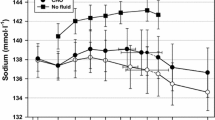Summary
This study compared the effects of ingesting 6% (MC) and 12% (HC) glucose/electrolyte beverages, and a flavored water placebo (P) on markers of fluid absorption, palatability, and physiological function during prolonged intermittent cycling in the heat. On three occasions, 15 trained male cyclists performed two 60 min cycling bouts at 65% \(\dot V_{{\text{O}}_{{\text{2 max}}} } \) (E 1 and E 2). A brief exhaustive performance ride (∼3 min) was completed after E 1 and E 2, and after 20 min recovery (P 1, P 2, P 3). Every 20 min, subjects consumed 275 mL of P, MC or HC. The first drink contained 20 mL of D2O, a tracer of fluid entry into blood plasma. Plasma D2O accumulation was slower for HC than for P and MC (P<0.001). HC caused more nausea (P<0.01) and fullness (P<0.05) than MC or P, and subjects said they would be less likely to consume HC during training or competition (P<0.10). Sweat rates, HR, T re, T sk, \(\dot V_{{\text{O}}_{\text{2}} } \), and PV were similar for all drinks. Performance of P 1, P 2, P 3 were not different among drinks. However, four cyclists failed to maintain the prescribed work rate during E 2 for HC but only one failed for MC and P. These data suggest that the slow absorption of a 12% glucose/electrolyte beverage during prolonged intermittent exercise in the heat may increase the risk of gastrointestinal distress and thereby limit performance.
Similar content being viewed by others
References
Adolph EF, Dill DB (1938) Observations on water metabolism in the desert. Am J Physiol 123:369–378
Bagby GJ, Green HJ, Katsuta S, Gollnick PD (1978) Glycogen depletion in exercising rats infused with glucose, lactate, or pyruvate. J Appl Physiol 45:425–429
Barnes G, Morton A, Wilson A (1984) The effect of a new glucose-electrolyte fluid on blood electrolyte levels, gastric emptying and work performance. Austr J Sci Med Sport 16:25–30
Benade AJS, Jansen CR, Rogers, Wyndam CH, Strydam NB (1973) Plasma insulin and carbohydrate metabolism after sucrose ingestion during rest and prolonged aerobic exercise. Pflügers Arch 342:207–218
Bergstrom J, Hultman E (1967) A study of the glycogen metabolism during exercise in man. J Clin Lab Invest 19:218–228
Costill DL, Saltin B (1974) Factors limiting gastric emptying during rest and exercise. J Appl Physiol 37:679–683
Costill DL, Kammer WF, Fisher A (1970) Fluid ingestion during distance running. Arch Environ Health 21:520–525
Costill DL, Cote R, Miller E, Miller T, Wynder S (1975) Water electrolyte replacement during repeated days of work in the heat. Aviat Space Environ Med 46:797–800
Coyle EF, Coggan AR (1984) Effectiveness of carbohydrate feeding in delaying fatigue during prolonged exercise. Sports Med 1:446–458
Coyle EF, Coggan AR, Hemmert MK, Ivy JL (1986) Muscle glycogen utilization during prolonged strenuous exercise when fed carbohydrate. J Appl Physiol 61:165–172
Coyle EF, Costill DL, Fink WJ, Hoopes DG (1978) Gastric emptying rates for selected athletic drinks. Res Q 49:119–124
Coyle EF, Hagberg JM, Hurley BF, Martin WH, Ehsani AA, Holloszy JO (1983) Carbohydrate feeding during prolonged strenuous exercise can delay fatigue. J Appl Physiol 55:230–235
Davis JM, Lamb DR, Burgess WA, Bartoli WP (1987) Accumulation of Deuterium Oxide (D2O) in body fluids following ingestion of D2O-labeled beverages. J Appl Physiol 63:2060–2066
Davis JM, Lamb DR, Pate RR, Slentz CA, Burgess WA, Bartoli WP (1988) Carbohydrate/electrolyte drinks: effects on endurance cycling in the heat. Am J Clin Nutr (in press)
Dill DB, Costill DL (1974) Calculation of percentage changes in volumes of blood, plasma and red cells in dehydration. J Appl Physiol 37:247–248
Fielding RA, Costill DL, Fink WJ, King DS, Hargreaves M, Kovaleski JE (1985) Effect of carbohydrate feeding frequencies and dosage on muscle glycogen use during exercise. Med Sci Sports Exerc 17:472–476
Fordtran JS, Saltin B (1967) Gastric emptying and intestinal absorption during prolonged severe exercise. J Appl Physiol 23:331–335
Hargreaves M, Costill DL, Coggan A, Fink WJ (1984) Effect of carbohydrate feedings on muscle glycogen utilization and exercise performance. Med Sci Sports Exerc 16:219–222
Hubbard RW, Sandick BL, Mathews WT, Francesconi RP, Sampson JB, Dorkot MJ, Maller O, Engell DB (1984) Voluntary dehydration and alliesthesia for water. J Appl Physiol 57:868–875
Ivy JL, Costill DL, Fink WJ, Lower RW (1979) Influence of caffeine and carbohydrate feedings on endurance performance. Med Sci Sports 11:6–11
Ivy JL, Miller W, Dover V, Goodyear LG, Sherman WM, Farrell S, Williams H (1983) Endurance improved by ingestion of a glucose polymer supplement. Med Sci Sports Exerc 15:466–471
Lamb DR, Brodowicz GR (1986) Optimal use of fluids of varying formulations to minimise exercise-induced disturbances in homeostasis. Sports Med 3:247–274
Nielsen B (1984) Dehydration, rehydration and thermoregulation. Med Sport Sci 17:81–96
Owen MD, Kregel KC, Wall PT, Gisolfi CV (1986) Effects of carbohydrate ingestion on thermoregulation, gastric emptying and plasma volume during exercise in the heat. Med Sci Sports Exerc 18:568–575
Pirnay F, Lacroix M, Mosora F, Luycky A, Lefebvre P (1977) Glucose oxidation during prolonged exercise evaluated with naturally labeled (13C)-glucose. J Appl Physiol 43:258–261
Pitts GL, Johnson RE, Consolozio FC (1944) Work in the heat as affected by intake of water, salt and glucose. Am J Physiol 142:253–259
Sjogaard G, Nielsen B, Mikkelsen F, Saltin B, Burke ER (1985) Physiology in bicycling. Mouvement Publications, Inc Ithica, New York, pp 73–75
Author information
Authors and Affiliations
Rights and permissions
About this article
Cite this article
Davis, J.M., Burgess, W.A., Slentz, C.A. et al. Effects of ingesting 6% and 12% glucose/electrolyte beverages during prolonged intermittent cycling in the heat. Europ. J. Appl. Physiol. 57, 563–569 (1988). https://doi.org/10.1007/BF00418463
Accepted:
Issue Date:
DOI: https://doi.org/10.1007/BF00418463




